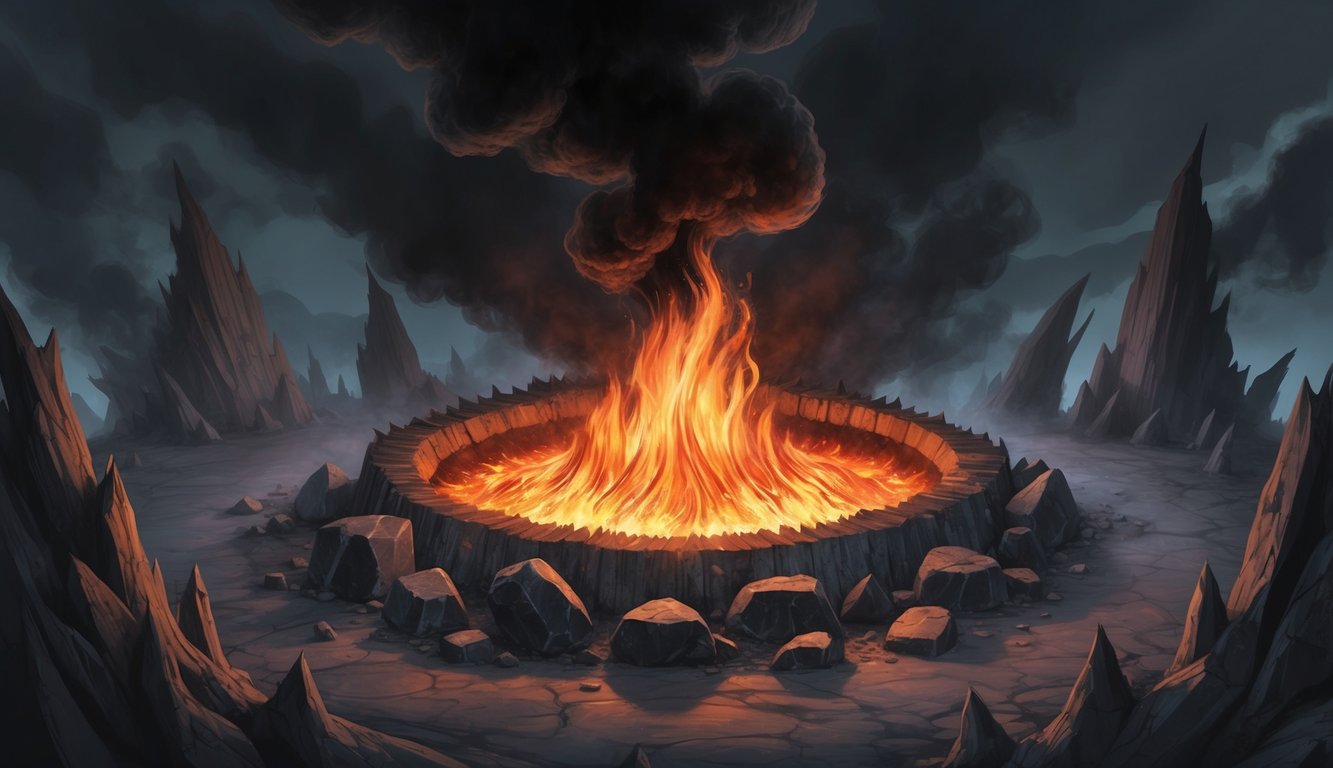Don’t Miss Out On This Unique Astrological Opportunity
Are you tired of spinning your wheels and getting nowhere? Simply put, you’re out of sync: you’re out of alignment with your astral configuration.
But: there’s a kind of map that can help you reclaim your alignment. Think of it as your own personal blueprint to success and happiness: a blueprint that will help you live your most amazing life.
Get started here.
When exploring the concept of hell in the Bible, you find a mix of descriptions that emphasize both judgment and eternal consequences.
The Bible mentions hell in various contexts, shedding light on the intensity of divine judgment. Bible verses about hell often highlight the notion of eternal punishment for those who stray from righteous paths.
Jesus’ teachings frequently focus on the reality of hell, portraying it as a place of separation from God.
These scriptures aim to guide followers towards living a life of faith and devotion, steering them away from actions that may lead to eternal separation.
Understanding these teachings can inspire you to reflect on your faith and moral choices.
The concept of salvation in the Bible is closely related to the idea of escaping hell.
Salvation offers a pathway to eternal life and avoiding condemnation.
Through these teachings, believers are encouraged to strengthen their faith and help others see the significance of living in accordance with biblical principles.
Key Takeaways
- Bible verses focus on judgment and eternal punishment.
- Jesus emphasizes hell as separation from God.
- Salvation provides a path to eternal life.
Theological Concept of Hell
The concept of hell in the Bible varies across different parts of the scripture.
Key images include fire, Hades, and eternal punishment, offering a complex view of the afterlife’s darker aspects.
Hell in Different Biblical Testaments
In the Old Testament, the term Sheol is often used.
It represents a shadowy place where the dead reside.
This term does not specify punishment but serves as a general dwelling for those who have passed away.
The New Testament, however, introduces Hades and expands the idea of punishment. Hades becomes more than just a resting place; it is linked with torment and suffering.
The concept of the lake of fire, described in Revelation, introduces the idea of the second death.
This is depicted as eternal separation from God.
Descriptions of Hell
Descriptions of hell focus on elements like fire, pain, and eternal punishment.
The phrase lake of fire is especially significant and is often associated with the final judgment.
Hell is depicted as a place of unending suffering, reinforcing the severity of eternal punishment.
This isn’t just a physical punishment but a spiritual separation from God.
The emphasis on fire further highlights the intense, consuming nature of this torment.
The vision of hell serves as a warning.
It underscores the importance of faith and righteousness in avoiding eternal punishment.
In this view, hell is more than a physical location; it is a state of being away from divine grace.
Biblical Verses on Hell and Eternal Punishment
Understanding the concept of hell in biblical texts involves exploring the themes of divine judgment and the consequences of sin.
These elements illustrate how eternal punishment is portrayed through vivid imagery and teachings in scripture.
Biblical descriptions of hell often emphasize separation from God, reflecting the spiritual consequences of a life led away from divine guidance.
However, various theological interpretations explore the balance between justice and mercy, with some perspectives considering the nonjudgment principle explained in relation to God’s ultimate plan for redemption.
These discussions highlight the complexity of scriptural teachings on judgment and the hope for reconciliation within Christian thought.
Judgment and Consequences for Sin
In the Bible, hell is depicted as a place of punishment for those who sin. Matthew 25:46 describes hell as eternal punishment, contrasting it with eternal life for the righteous.
This verse highlights the lasting outcome of judgment.
The wrath of God is often linked with judgment.
Verses like Romans 2:5 warn of storing up wrath for the day of judgment.
Your sins are said to bring consequences, leading to eternal fire and torment.
Another key concept is the “second death“, mentioned in Revelation 21:8, representing eternal separation from God.
This emphasizes the serious nature of divine judgment and the ultimate destruction facing those who reject righteousness.
Illustrations of Punishment
The Bible uses vivid imagery to portray the suffering associated with hell.
The term “eternal fire” in Matthew 18:8 serves as a stark illustration of ongoing torment reserved for the wicked.
This imagery conveys the severity of separation from God.
Mark 9:48 describes hell as a place where the “worm does not die, and the fire is not quenched.” Such verses illustrate unending torment as a result of sin and rejection of God’s path.
In scripture, concepts like destruction and punishment are closely tied.
According to 2 Thessalonians 1:9, those who do not know God “will be punished with everlasting destruction.” These examples emphasize the gravity of the choices you make and their eternal consequences.
Jesus’ Teachings on Hell

Jesus spoke often about hell in the Bible, using vivid language and imagery to convey its severity.
These teachings highlight hell as a place of punishment, using stories and warnings to emphasize its seriousness.
Parables and Metaphors
In parables, Jesus used symbolic language to help people understand complex ideas.
One major theme in these stories is the concept of hell as a place of severe punishment.
For example, the parable of the rich man and Lazarus in Luke 16:19-31 describes a chasm that cannot be crossed, highlighting the finality of one’s fate.
In other passages, Jesus refers to hell using imagery like the “lake of fire” and “outer darkness,” where there will be “weeping and gnashing of teeth.”
These descriptions underscore hell’s torment and permanence.
In Matthew 5:29, Jesus advises that it is better to lose a part of the body than to be thrown into hell.
Such strong imagery communicates that hell is a place you should avoid at all costs.
Warnings and Admonitions
Jesus frequently warned his followers about the dangers of sin and the reality of hell.
He spoke in Matthew 10:28 of fearing the one who can destroy both soul and body in hell.
This passage reminds believers of eternal destruction as a more significant concern than physical death.
Other warnings include passages like Matthew 5:22, where Jesus equates anger with murder and suggests that such actions put one in danger of hellfire.
Mark 9:43 advises you to cut off a hand if it causes sin because hell is an unquenchable fire.
Through these warnings, Jesus emphasizes the need for righteousness to avoid such a fate.
Salvation and Escape from Hell

The concept of escaping hell is deeply rooted in the hope of eternal life through faith in Christ Jesus.
Salvation is a gift that promises redemption for those who turn away from sin and embrace a life led by the Spirit.
The Gift of Eternal Life through Christ
Eternal life is a promise made to those who believe in Jesus Christ.
According to John 3:16-18, God’s love is demonstrated by sending His Son so that believers may not perish but have eternal life.
This life is not just endless existence; it’s a life filled with peace and joy in the presence of God.
Your faith in Christ opens the door to this new life, transforming you and freeing you from the guilt and punishment of sin.
The role of the church is to guide and nurture your journey, helping you understand this promise and how to live according to it.
Repentance and Redemption
Repentance is turning away from sin and seeking God’s mercy.
It involves acknowledging your wrongdoings and feeling true remorse.
Romans 6:23 emphasizes the gravity of sin, stating that its wages are death, but God’s gift is eternal life in Christ Jesus.
Through repentance, you receive forgiveness and are redeemed in God’s eyes.
Redemption brings you closer to God, helping you live according to His will.
This process requires continuous growth in faith and commitment to spiritual renewal.
Active participation in the community of believers can support you in achieving this transformation, offering encouragement and accountability on your journey toward salvation.
Frequently Asked Questions

When examining biblical texts, several questions arise about the concept of hell.
Different versions of the Bible, including the King James Version, depict hell in various ways, providing unique insights.
What passages in the Bible refer to the concept of hell?
Biblical references to hell can be found in both the Old and New Testaments.
Notably, the term “gehenna” is often translated as “hell,” indicating a place of punishment.
This term appears prominently in discussions about judgment and the afterlife.
For more, you may refer to Four Views on Hell.
How does the King James Version depict the idea of hell?
The King James Version (KJV) of the Bible commonly uses words like “hell,” “Hades,” and “gehenna” to describe a place of eternal punishment.
Each term carries distinct meanings but collectively presents hell as a place of torment and separation from divine presence.
Which verses describe hell as a lake of fire?
Revelation in the New Testament speaks of a “lake of fire,” explicitly connecting it to hell.
Revelation 20:14-15 describes the final judgment scene, where death and Hades are thrown into this lake, symbolizing eternal punishment.
Are there references to hell in the Old Testament?
While the Old Testament uses the term “Sheol” to describe the realm of the dead, it often lacks the explicit punishment imagery of the New Testament.
The concept evolves with later texts, but Sheol remains a place where all deceased souls reside.
What did Jesus Christ teach about hell?
Jesus often warned about hell in his teachings, focusing on the consequences of sin and the importance of righteousness.
For example, he frequently referenced “gehenna” to illustrate a state of spiritual destruction and separation from God.
How is hell described through different biblical accounts?
Biblical accounts characterize hell with consistent themes of torment and judgment.
In the New Testament, it’s described as a place of weeping, gnashing of teeth, and eternal fire.
Different gospel writers offer slight variations, but the unified theme underscores its significance as a place to be avoided through faith.



